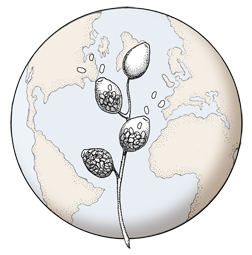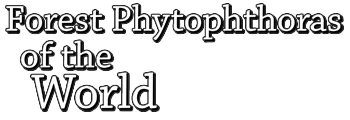References
. Report of the imperial mycologist, 1918–1919. Science Report Institute Pusa. 0 :82 pp.
. Towards a best practice methodology for the detection of Phytophthora species in soils. Plant Pathology [Internet]. 2020 ;Early view. Available from: https://bsppjournals.onlinelibrary.wiley.com/doi/abs/10.1111/ppa.13312?af=R
Current and projected global distribution of Phytophthora cinnamomi, one of the world's worst plant pathogens. Global Change Biology [Internet]. 2016 . Available from: http://dx.doi.org/10.1111/gcb.13492
. Re-evaluation of Phytophthora species isolated during 30 years of vegetation health surveys in western Australia using molecular techniques. Plant Disease. 2009 ;93(3):215 - 223.
. Root rots caused by Phycomycetes. 1927 :51 pp.
. A leaf and twig disease of English holly caused by Phytophthora ilicis N. sp. Phytopathology. 1957 ;47:95-101.
. Colonization of tree xylem by Phytophthora ramorum, P. kernoviae and other Phytophthora species. Plant Pathology [Internet]. 2007 ;56:227–241. Available from: http://dx.doi.org/10.1111/j.1365-3059.2006.01511.x
. Phytophthora palmivora. [Internet]. 2005 ;Number 12:2 pp. Available from: http://www2.ctahr.hawaii.edu/adap/ASCC_LandGrant/Dr_Brooks/BrochureNo12.pdf
. Diversity and Pathogenicity of Phytophthora Species Associated with Declining Alder Trees in Italy and Description of Phytophthora alpina sp. nov. Forests [Internet]. 2020 ;11(8):848. Available from: https://www.mdpi.com/1999-4907/11/8/848/htm
. Phytophthora species recovered from the Connecticut River Valley in Massachusetts, USA. Mycologia [Internet]. 2016 ;108(1):6 - 19. Available from: https://www.tandfonline.com/doi/full/10.3852/15-038
. Sudden Oak Death: Phytophthora ramorum exhibits transatlantic differences. Mycological Research [Internet]. 2003 ;107:257-259. Available from: http://dx.doi.org/10.1017/S0953756203227660
. Cultural characters, protein patterns and unusual mating behaviour of Phytophthora gonapodyides isolates from Britain and North America. Mycological Research [Internet]. 1993 ;97(11):1287 - 1298. Available from: https://linkinghub.elsevier.com/retrieve/pii/S0953756209801603
. Comparative aggressiveness of standard and variant hybrid alder phytophthoras, Phytophthora cambivora and other phytophthora species on bark of alnus, Quercus and other woody hosts. Plant Pathology [Internet]. 2001 ;50:218. Available from: http://onlinelibrary.wiley.com.proxy.library.oregonstate.edu/doi/10.1046/j.1365-3059.2001.00553.x/abstract
. Evidence for Phytophthora cinnamomi involvement in Iberian oak decline. Plant Pathology [Internet]. 1993 ;42:140–145. Available from: http://dx.doi.org/10.1111/j.1365-3059.1993.tb01482.x
. Taxonomy of Phytophthora palmivora on cocoa. Transactions of the British Mycological Society [Internet]. 1979 ;72(1):111 - 143. Available from: http://www.sciencedirect.com/science/article/pii/S0007153679800157
. Four phenotypically and phylogenetically distinct lineages in Phytophthora lateralis. Fungal Biology [Internet]. 2012 :-. Available from: http://www.sciencedirect.com/science/article/pii/S1878614612001717?v=s5
. Origin of a new Phytophthora pathogen through interspecific hybridization. Proceedings of the National Academy of Sciences of the United States of America [Internet]. 1999 ;96:5878-5883. Available from: http://www.pnas.org/content/96/10/5878.abstract
. Cultural characters, protein patterns and unusual mating behaviour of Phytophthora gonapodyides isolates from Britain and North America. Mycological Research [Internet]. 1993 ;97:1287 - 1298. Available from: http://www.sciencedirect.com/science/article/B7XMR-4VXMWBV-2/2/79f23cf89ac836528cb576d2f46f81b3
. Natural stem infection of Lawson cypress (Chamaecyparis lawsoniana) caused by Phytophthora ramorum. New Disease Reports [Internet]. 2012 ;25:26. Available from: http://dx.doi.org/10.5197/j.2044-0588.2012.025.026
. An unusual Phytophthora associated with widespread alder mortality in Britain. Plant Pathology [Internet]. 1995 ;44:999 - 1007. Available from: http://onlinelibrary.wiley.com/doi/10.1111/j.1365-3059.1995.tb02658.x/abstract
. Sudden oak death (Phytophthora ramorum) discovered on trees in Europe. Mycological Research [Internet]. 2004 ;108:1108-1110. Available from: http://dx.doi.org/10.1017/S0953756204221244
. Production of gametangia by Phytophthora ramorum in vitro. Mycological Research [Internet]. 2004 ;108:823 - 827. Available from: http://www.sciencedirect.com/science/article/pii/S0953756208603949
. Phytophthora alni sp. nov. and its variants: designation of emerging heteroploid hybrid pathogens spreading on Alnus trees. Mycological Research [Internet]. 2004 ;108:1172-1184. Available from: http://dx.doi.org/10.1017/S0953756204001005
. Multiple new phenotypic taxa from trees and riparian ecosystems in Phytophthora gonapodyides-P. megasperma ITS Clade 6, which tend to be high-temperature tolerant and either inbreeding or sterile. Mycological Research [Internet]. 2003 ;107:277 - 290. Available from: http://www.sciencedirect.com/science/article/B7XMR-4RT04VN-6/2/68f2582c518f07f52e7a0db891ca14dd



 ]
]